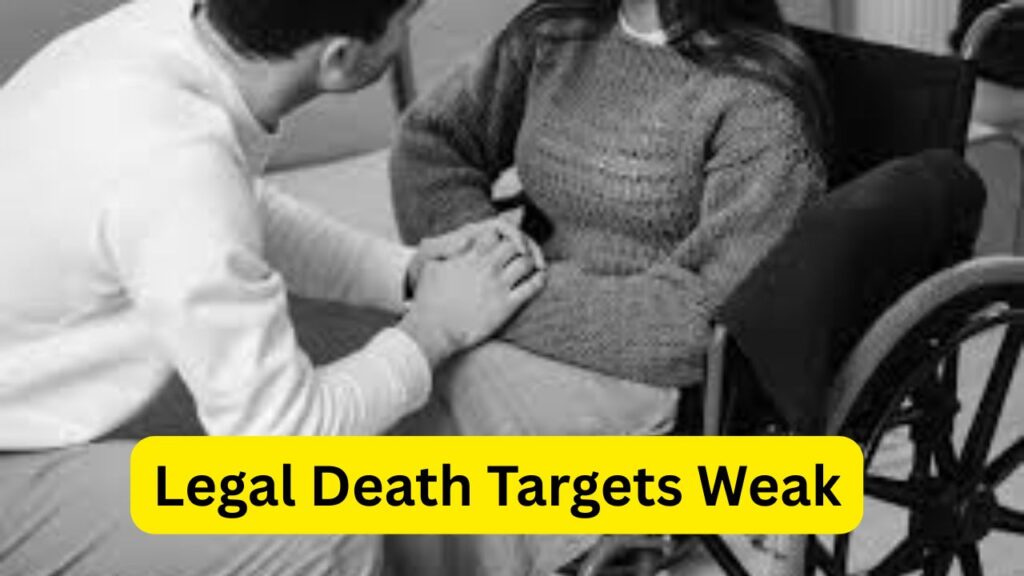Legalising Euthanasia Threatens – The debate around legalising euthanasia in Australia has raised serious ethical and social concerns, especially for the disabled and elderly. Supporters call it a compassionate choice, but opponents argue it places vulnerable Australians at risk of being pressured into ending their lives. With an ageing population and rising healthcare costs, the fear is that legal euthanasia could shift from an option to an expectation. This article explores how such laws might harm those most in need of care and dignity — our elderly and disabled citizens across Australia.

The Risk to Vulnerable Disabled Australians
For people with disabilities in Australia, the legalisation of euthanasia poses unique dangers. Many already face discrimination, social isolation, and assumptions about their quality of life. If euthanasia becomes normalised, disabled Australians could feel that society views their lives as less valuable. Medical and social systems might subtly encourage assisted dying instead of improving access to quality palliative care and mental health support. The focus should be on inclusion, support, and empowerment — not ending lives prematurely. True compassion lies in valuing every life equally, regardless of physical or mental condition.
How Legal Euthanasia Could Affect Elderly Australians
Among the elderly population in Australia, the fear of becoming a burden often drives discussions about euthanasia. Legalisation could amplify this fear, making seniors feel pressured by family members or strained healthcare systems. Many elderly Australians already experience loneliness and inadequate care in aged facilities. Introducing euthanasia as a legal option could unintentionally signal that their lives are expendable. Instead of promoting death as a solution, Australia should invest in better home care, hospice services, and emotional counselling that affirm the value and dignity of older citizens.
| Concern | Impact on Disabled & Elderly |
|---|---|
| Social Pressure | Fear of being a burden may influence decisions |
| Healthcare Costs | May create financial incentives for assisted dying |
| Mental Health | Depression could lead to irreversible choices |
| Medical Ethics | Doctors may face conflicts between care and death |
| Palliative Care | Funding may shift away from end-of-life support |
Protecting Human Dignity Across Australia
Protecting the dignity of every Australian citizen should remain a national priority. Instead of passing euthanasia laws, the Australian government could strengthen mental health services, expand palliative care access, and increase funding for carers. Each individual, regardless of disability or age, deserves to live with respect and hope. By promoting policies that prioritise care over killing, Australia can ensure that no citizen ever feels their life has lost meaning or value. Upholding human dignity means supporting life, even in its most fragile form.
Alternatives to Euthanasia for Australians
Rather than legalising euthanasia, Australia can focus on developing compassionate alternatives. Expanding hospice programs, improving disability inclusion policies, and training healthcare providers in empathetic communication can make a profound difference. When elderly and disabled Australians receive adequate support, love, and care, their desire for assisted death often diminishes. The solution lies in hope, not harm. Through community and government action, Australia can lead the world in ethical and compassionate healthcare that truly respects every human life.
Frequently Asked Questions (FAQs)
1. Why is euthanasia dangerous for disabled Australians?
It can create pressure and suggest that lives with disabilities are less worth living.
2. How could euthanasia laws affect elderly Australians?
They may feel guilt or fear about being a burden, leading to unnecessary deaths.
3. What alternatives exist to euthanasia in Australia?
Improved palliative care, counselling, and disability support offer compassionate options.
4. How can Australia protect its vulnerable citizens?
By investing in mental health, aged care, and inclusive community programs nationwide.




